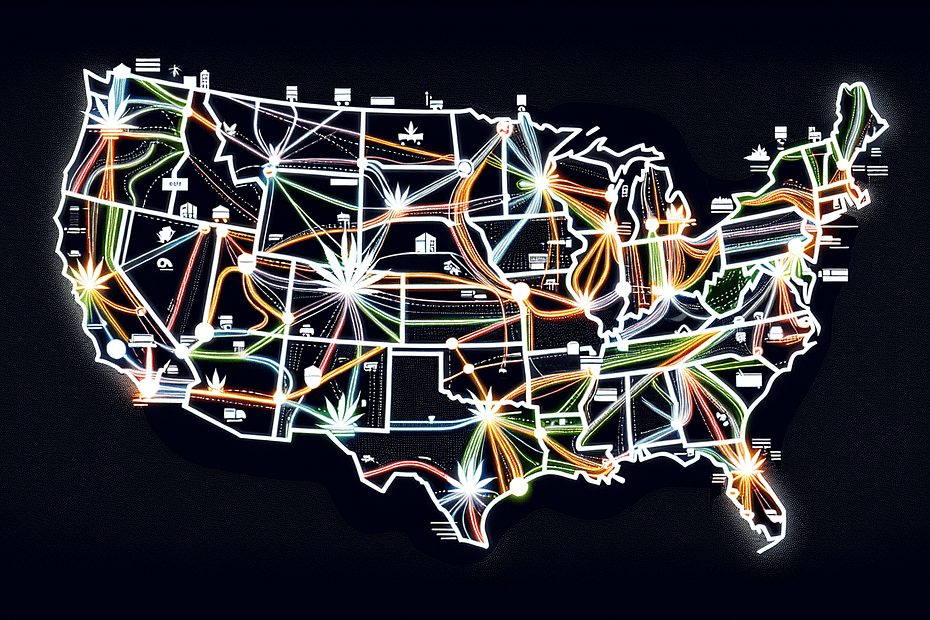How To Navigate Interstate Cannabis Transportation Regulations?
Are you looking to transport cannabis across state lines but are unsure about the regulations that govern this process? If so, you’ve come to the right place! In this article, we will discuss everything you need to know about interstate cannabis transportation regulations.
Understanding Federal Cannabis Laws
Before diving into the interstate transportation regulations, it’s important to understand the federal laws surrounding cannabis. Cannabis, whether for medical or recreational use, is illegal at the federal level in the United States. This means that transporting cannabis across state lines, even between states where it is legal, is considered a federal offense.
However, the federal government has taken a hands-off approach when it comes to states that have legalized cannabis for medical or recreational use. This has led to a patchwork of state laws that vary widely in terms of regulations and enforcement.
State Cannabis Laws and Regulations
Each state has its own laws and regulations governing the cultivation, distribution, and transportation of cannabis. It’s crucial to familiarize yourself with the specific laws of the states you will be traveling through or to prior to transporting any cannabis products.
Some states have strict regulations in place that prohibit the transportation of cannabis across state lines, while others have more lenient laws that allow for the transportation of cannabis within state boundaries. It’s important to research the laws of each state you will be traveling through to ensure compliance.
Interstate Commerce Clause
The Interstate Commerce Clause of the U.S. Constitution gives Congress the authority to regulate commerce that crosses state lines. This means that the federal government has the power to regulate the transportation of goods, including cannabis, between states.
Because of this clause, transporting cannabis across state lines is considered a federal offense, even if the cannabis is legal in both states. It’s essential to be aware of the implications of the Interstate Commerce Clause when it comes to interstate cannabis transportation.
The Cole Memo
The Cole Memo was a memo issued by the U.S. Department of Justice in 2013, which provided guidance to federal prosecutors on how to prioritize the enforcement of cannabis laws. The memo stated that as long as states with legalized cannabis abide by certain guidelines, such as preventing the distribution of cannabis to minors and preventing revenue from going to criminal enterprises, the federal government would not interfere with state cannabis laws.
However, in 2018, then-Attorney General Jeff Sessions rescinded the Cole Memo, giving federal prosecutors the authority to enforce federal cannabis laws at their discretion. This has created uncertainty for states with legalized cannabis and has made it even more crucial to be aware of the federal regulations surrounding cannabis transportation.
Rules and Restrictions for Interstate Cannabis Transportation
When it comes to transporting cannabis across state lines, there are several rules and restrictions that you must adhere to. These regulations vary depending on the states involved and the mode of transportation used. Here are some key rules and restrictions to keep in mind:
Mode of Transportation
The mode of transportation you choose for transporting cannabis will impact the regulations you must follow. Whether you are transporting cannabis by car, plane, train, or another mode of transportation, it’s essential to research the specific regulations governing the transportation of cannabis via that mode.
For example, if you are transporting cannabis by car, you must ensure that the cannabis is stored securely and out of reach of the driver. If you are transporting cannabis by plane, you must abide by the regulations set forth by the Transportation Security Administration (TSA) and the Federal Aviation Administration (FAA).
Quantity Limits
Many states have quantity limits in place for the transportation of cannabis. It’s important to be aware of these limits and ensure that you are not transporting more cannabis than is legally allowed.
For example, some states may limit the amount of cannabis that can be transported to one ounce for recreational use and two ounces for medical use. Exceeding these limits can result in criminal charges and hefty fines.
Packaging and Labeling Requirements
When transporting cannabis, it must be packaged and labeled in accordance with state regulations. Most states require cannabis products to be sealed in child-resistant packaging and labeled with the product’s potency, ingredients, and origin.
Failing to adhere to packaging and labeling requirements can result in legal consequences and may compromise the quality and safety of the cannabis products being transported.
Licensing and Permits
In some states, transporting cannabis across state lines requires a specific license or permit. It’s essential to research the licensing requirements of each state you will be traveling through or to and obtain any necessary permits prior to transporting cannabis.
Getting caught transporting cannabis without the proper licensing or permits can result in severe penalties, including criminal charges and the confiscation of the cannabis products.
Tips for Compliant Interstate Cannabis Transportation
To ensure that you are complying with interstate cannabis transportation regulations, here are some tips to keep in mind:
Plan Ahead
Before embarking on a journey that involves transporting cannabis across state lines, take the time to research the laws and regulations of each state you will be traveling through. This will help you avoid any legal pitfalls and ensure a smooth and compliant transportation process.
Keep Documentation
It’s crucial to keep detailed documentation of the cannabis products you are transporting, including receipts of purchase, packaging labels, and any relevant permits or licenses. Having this documentation on hand can help demonstrate compliance with state regulations if questioned by law enforcement.
Secure Transportation
When transporting cannabis, it’s essential to keep the products secure and out of reach during transit. This means storing the cannabis in a locked container or compartment and ensuring that it is not accessible to the driver or passengers.
Be Transparent
If you are stopped by law enforcement while transporting cannabis, it’s important to be transparent about the presence of cannabis in your vehicle. Being upfront and honest can help establish trust and cooperation with law enforcement and may lead to a smoother interaction.
Conclusion
Navigating interstate cannabis transportation regulations can be complex and daunting, but with a thorough understanding of federal and state laws, as well as adherence to rules and restrictions, it can be done safely and legally. Always remember to research the laws of each state you will be traveling through and take the necessary precautions to ensure compliant and secure transportation of cannabis products. By following the tips outlined in this article, you can navigate interstate cannabis transportation regulations with confidence and peace of mind.



